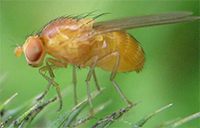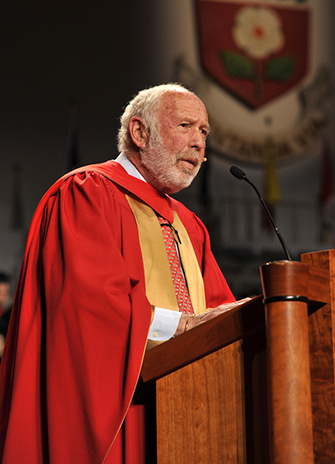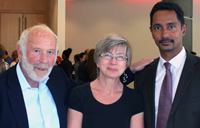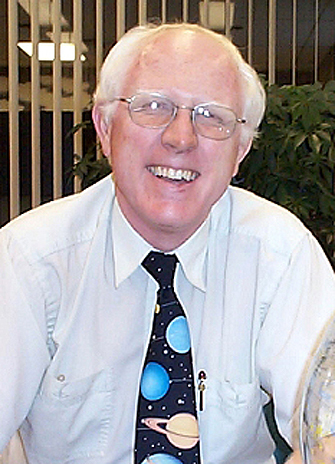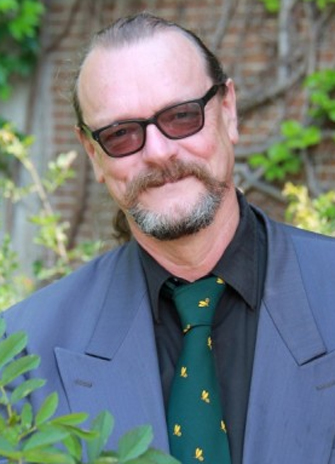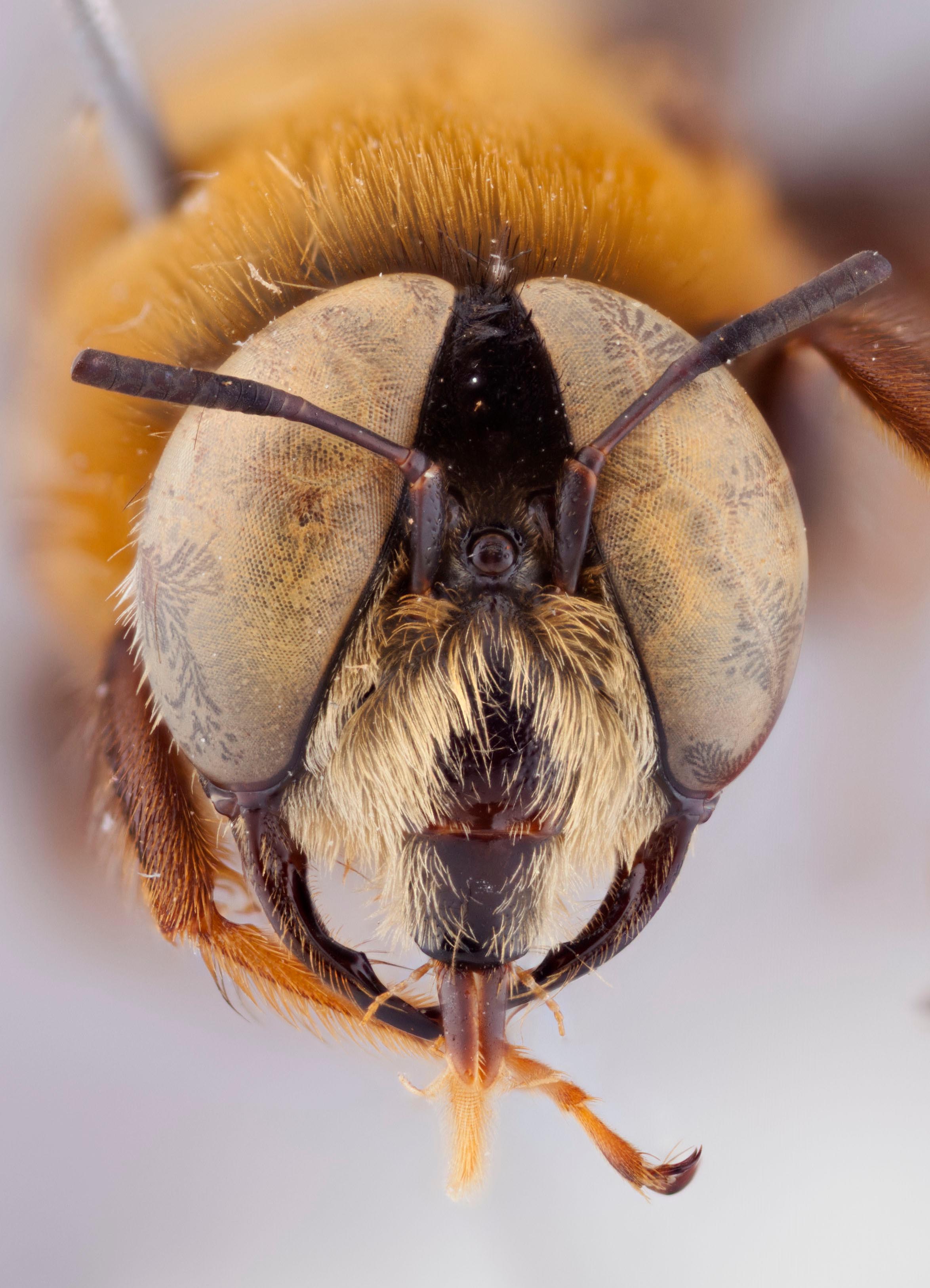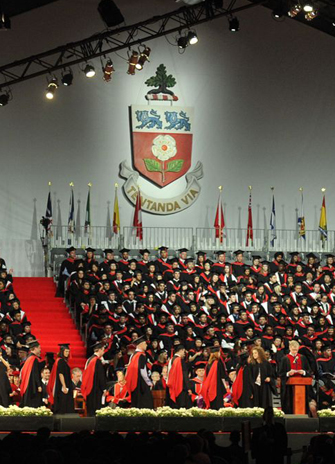Thirteen outstanding individuals will be recognized with honorary degrees at York University’s spring convocation for their significant contributions to society and in their respective fields. The recipients include a native rights activist, food advocate, theatre director, philanthropist, technology innovator and community leader.
“This year’s honorary degree recipients have made a remarkable impact in their communities through their work, social activism and volunteerism,” said Mamdouh Shoukri, York University president and vice-chancellor. “Their leadership and vision has had far-reaching effects that have inspired important societal changes and positively touched countless lives.”
Convocation ceremonies will be held from June 17 to 25. The Convocation website includes a full schedule of all ceremonies. All ceremonies will take place at the Convocation Pavilion, located at the Aviva Centre, 1 Shoreham Drive, at York University’s Keele campus, except for the Saturday, June 25 ceremony, which will be held at Glendon College.
Here are the recipients in order of the Faculty ceremonies at which they will be honoured:
Debbie Field – Food advocate, social activist, educator
Honorary Doctor of Laws
Faculty of Health I – Friday, June 17, 10:30am
Debbie Field is an international leader in creating a more socially just and environmentally sustainable food system. As executive director of FoodShare, Canada’s largest food security organization, she has generated innovative solutions to problems at all levels of the food system. A social activist, Field has collaborated with York University faculty and students for two decades on research, advocacy and public education. She has also contributed to both movement-building and policy change at the municipal, provincial and federal levels. For her contributions, she has received many accolades including the Ophea Award for Outstanding Contribution, a Queen Elizabeth II Jubilee Medal, OPSEU Bread and Roses Award, a Vital People Award and a Toronto Green Leader.
John Friedmann – Planning theorist and scholar
Honorary Doctor of Laws
Faculty of Health II and Faculty of Environmental Studies – Friday, June 17, 3:30pm
John Friedmann is one of the most influential planning academics alive. Born in Austria in 1926, he received his PhD from the University of Chicago and has published 15 individually authored books, 11 co-edited books, and more than 200 chapters, articles and reviews. He is a professor emeritus in the School of Public Affairs at the University of California, Los Angeles, and an honorary professor in the School of Community and Regional Planning at the University of British Columbia. In 1996, he conducted a much-recognized seminar with planning faculty and students at the Faculty of Environmental Studies at York University. Outside of planning scholarship, Friedmann is best known for his seminal work on his world city theory. He is a recipient of a Guggenheim Fellowship, the Order of Bernardo O’Higgins from Chile and the first UN-Habitat Lecture Award for lifetime achievement in the service of human settlements.
Victor Phillip Dahdaleh – Business leader, philanthropist
Honorary Doctor of Laws
Faculty of Health III – Monday, June 20, 10:30am
Victor Phillip Dahdaleh (BA Hons) is owner and chair of Dadco, a privately owned investment, manufacturing and trading group. Recently, he established the Dahdaleh Institute for Global Health at York University with a transformational contribution of $20 million, the largest gift ever received from a graduate of the University. Dahdaleh is an Honorary Fellow of the London School of Economics, a trustee of the Clinton Foundation, a board member of the McGill University Trust, a board member of the International Aluminium Institute, a Fellow of the Duke of Edinburgh Award World Fellowship and immediate past-president of the Canada-United Kingdom Chamber of Commerce. The Victor Phillip Dahdaleh Charitable Foundation funds many organizations worldwide, focusing on education, health-related research, economic and social development, and the arts.
Jillian Keiley – Theatre director
Honorary Doctor of Letters
School of Arts, Media Performance & Design and Faculty of Liberal Arts and Professional Studies I – Monday, June 20, 3:30pm
Since graduating from York University, Jillian Keiley (BFA ’94) has become a leading director in Canadian theatre. Founder of Artistic Fraud of Newfoundland, she has directed and taught across Canada and has worked internationally. She is the artistic director of the National Arts Centre (NAC) English Theatre, a position she has held since 2012. Her productions at the NAC have included a re-working of Tartuffe set in Newfoundland, Artistic Fraud’s Oil and Water and Alice Through the Looking-Glass, which she also directed for the Stratford Festival. Her production of Tempting Providence by Robert Chafe toured nationally and internationally for 12 years. Keiley received the prestigious Siminovitch Prize in Theatre (directing) in 2004 and the Canada Council’s John Hirsch Prize in 1997.
Jeannette Corbiere Lavell – Native women’s rights activist, educator
Honorary Doctor of Laws
Faculty of Liberal Arts and Professional Studies II – Tuesday, June 21, 10:30am
Jeannette Lavell, a member of the Wikwemikong First Nation in Ontario, is best known for the Lavell Case, which challenged the Indian Act before the Supreme Court of Canada, after she lost her Indian status by marrying a non-native in 1970. Her failed challenge inspired a later case that brought the issue of status removal to the United Nations International Human Rights Commission. In 1985, the Indian Act was amended to remove the discriminatory clauses against native women. She has served as president of the Native Women’s Association of Canada, a cabinet appointee to the Commission on the Native Justice System, president of the Nishnawbe Institute and president of Anduhyaun Inc. After earning a teaching degree, she worked as a teacher and school principal in her community. She is a recipient of the 2009 Governor General Awards in Commemoration of the Persons Case, honouring Canadians who advance gender equality.
Roger Mahabir – Technology innovator, community leader
Honorary Doctor of Laws
Faculty of Liberal Arts and Professional Studies III – Tuesday, June 21, 3:30pm
Roger Mahabir is chair and CEO of Tracker Networks Inc., as well as president and CEO of Technology Innovations Inc. Most recently, he was chair and chief executive of Assurent Secure Technologies, a successful software security company he sold to Telus. Born in Trinidad, he has been inducted into the Canadian Information Productivity Hall of Fame for his innovations in technology. He has served as chief information officer in several Fortune 500 organizations and is recognized as one of IT industry’s top transformative leaders. His achievements have won international acclaim and been archived by the Smithsonian. A former student of York University’s Atkinson College and graduate of Ryerson University, he is an angel investor and mentor to entrepreneurial students and senior executives in Canada. He remains active with community groups, charities and his local church, where he has served in several capacities for over 30 years.
Ann B. (Rusty) Shteir – Feminist scholar, academic leader
Honorary Doctor of Laws
Faculty of Liberal Arts and Professional Studies IV – Wednesday, June 22, 10:30am
A pioneer of interdisciplinary feminist research and teaching in North America, Ann Shteir has been teaching at York University since 1972. She was among the founders of York’s graduate program in women’s studies in 1992, serving as its first director from 1993 to 1997. She has taught and developed undergraduate and graduate courses in humanities, women’s studies on gender, women’s and feminist history, and cultural history. Shteir received her PhD in comparative literature from Rutgers University. Her monograph, Cultivating Women, Cultivating Science: Flora’s Daughters and Botany in England, 1760 to 1860, won the prestigious Joan Kelly Memorial Prize in Women’s History. Over the years, her feminist impact has not only opened institutional doors for female scholars, but it has generated groundbreaking scholarship in women’s history.
David F. Denison – Businessman, community leader
Honorary Doctor of Laws
Faculty of Liberal Arts and Professional Studies V – Wednesday, June 22, 3:30pm
A Canadian businessman and chair of Hydro One, David Denison is the former president and CEO of the Canada Pension Plan Investment Board. He has had an extensive career in financial services in Canada, the United States and Europe. He is a Chartered Professional Accountant and a Fellow of the Institute of Chartered Accountants of Ontario. In 2014, he was appointed an officer of the Order of Canada, as well as a member of the Premier’s Advisory Council on Government Assets to review and identify opportunities to modernize government business enterprises in Ontario. In addition, he has provided lengthy and dedicated service as a compassionate volunteer to York University. He was first appointed to York’s Board of Governors in 2003 and served continuously in that capacity until 2011.
James Harris Simons – Mathematician, financier, philanthropist
Honorary Doctor of Science
Lassonde School of Engineering and Faculty of Science – Thursday, June 23, 10:30am
James Simons is chair of the Simons Foundation, an organization dedicated to advancing the frontiers of research in mathematics, basic sciences and the causes of autism. He is also board chair of Renaissance Technologies LLC, a highly quantitative investment firm. In 1975, he received the American Mathematical Society Veblen Prize in Geometry for work that involved a recasting of the subject of area minimizing multi-dimensional surfaces. His most influential research, called the Chern-Simons Invariants, has wide use particularly in theoretical physics. As founder and chair of the nonprofit organization Math for America, Simons is dedicated to improving math education in American public schools. In 2016, asteroid 6618, discovered by Clyde Tombaugh in 1936, was named Jimsimons by the International Astronomical Union in honor of his mathematical and philanthropic contributions.
Sylvia Maracle – Community leader, educator, activist
Honorary Doctor of Laws
Faculty of Education – Thursday, June 23, 3:30pm
Sylvia Maracle (Skonaganleh:ra) is a Mohawk from the Tyendinaga Mohawk Territory, a member of the Wolf Clan and a passionate advocate for urban Aboriginal Peoples, the cultural revitalization of her people and women’s rights. She has been involved in the Indigenous Friendship Centre Movement for over 40 years, serving as the executive director of the Ontario Federation of Indigenous Friendship Centres for much of that time. She is president of Native Child & Family Services of Toronto, co-chair of the City of Toronto Taskforce on Access and Equity, and past president of the Native Women’s Resource Centre. Maracle has fundamentally altered the landscape for urban Aboriginal programs and policies through her tireless work. Her achievements with a long list of regional and local organizations are internationally renowned and she is a recipient of a Queen Elizabeth II Diamond Jubilee Medal.
John Manley – Lawyer, businessman, politician
Honorary Doctor of Laws
Schulich School of Business – Friday, June 24, 10:30am
John Manley is a former Liberal deputy prime minister of Canada. First elected to Parliament in 1988 and re-elected three times, he served in the portfolios of Industry, Foreign Affairs and Finance. Following the Sept. 11 terrorist attacks, he was named chair of a cabinet committee on public security and anti-terrorism and awarded the 2001 Newsmaker of the Year by TIME Canada. Currently, he is president and CEO of the Business Council of Canada. After a 16-year career in politics, he returned to the private sector in 2004. An officer of the Order of Canada, he received a bachelor’s degree in mathematics and political science from Carleton University and a juris doctor from the University of Ottawa. He has been a key advisor to the Schulich School of Business at York University.
Joseph Arvay Q.C. – Lawyer, advocate for civil and human rights
Honorary Doctor of Laws
Osgoode Hall Law School – Friday, June 24, 3:30pm
Joseph Arvay has argued landmark cases involving civil liberties and constitutional rights. He has been counsel in Supreme Court of Canada cases establishing rights for the LGBTQ, drug addicts, sex workers, prisoners, First Nations communities, and most recently for those seeking physician assisted dying (Carter). He has served as a McMurtry Visiting Clinical Fellow at York University’s Osgoode Hall Law School. He delivered the Lewtas Lecture and devoted part of his time at Osgoode to mentoring students, lawyers and academics in clinical settings. He has received numerous honours, including the Advocate Society’s Justice Award, the Liberty Award from the British Columbia Civil Liberties Association and the Walter S. Tarnopolsky Human Rights Award. He was recognized by Canadian Lawyer as one of the top 25 most influential lawyers in Canada every year between 2010 and 2014.
Kevin G. Lynch – Economist, business leader, public servant
Honorary Doctor of Laws
Glendon College – Saturday, June 25, 2:30pm
Widely recognized as a renowned Canadian economist and policy advocate in public service, Kevin Lynch is the vice-chairman of BMO Financial Group and active on not-for-profit boards and international advisory committees. He began his career in 1976 with the Bank of Canada. He has served as deputy minister in the industry and finance portfolios, as well as executive director at the International Monetary Fund. He was the 20th clerk of the Privy Council of Canada, former secretary to the cabinet and former head of the Public Service of Canada. He retired from the Government of Canada in 2009. An officer of the Order of Canada, Lynch was made a member of the Queen’s Privy Council for Canada in 2009 and is a recipient of both the Queen’s Diamond and Golden Jubilee Medals for public service. He also lends his extensive experience to many community organizations.



